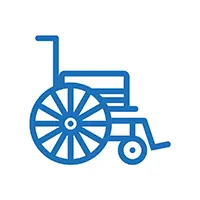Published 30 September 2019
Having impairments doesn’t need to restrict you - adaptive sports now offer people with disabilities the same level of activity and involvement as non-disabled people can have.
Murray Halberg, the great disabled runner, said: “Every New Zealander no matter what their ability has the right to participate in the sport or active recreation pursuit of their choice – there are no exceptions!”
Developments in technology provide access to sports and recreational activities for disabled people who otherwise might not be able to participate.
Here are some ideas for sports you could try if you have an impairment.
Boccia
Boccia is a bit like lawn bowls and petanque. It’s an indoor non-contact sport played from a seated position. Players bowl a soft leather ball towards a target. It can be played as individuals, in pairs, or teams of three.
Boccia is a fantastic social game, but if you want to take it to the top level it is also a Paralympic sport. Elite Boccia athletes display a high degree of muscle control, accuracy, concentration and tactical awareness.
Go to Boccia New Zealand (external link)
Sailing
Being surrounded by water, New Zealand is a great place to learn to sail and anyone can do it. Boats can be modified to be used by anyone no matter what their impairment is. Some common modifications include:
- centerline seats and joystick steering
- an electronic control system (similar to a power wheelchair)
- lifting systems to help you get in and out of the boat
- buoys and sound signals for people with visual impairments
For people with disabilities learning to sail, Hansa dinghies are commonly used because they are designed so they cannot flip over.
People who want to participate in competitive sailing can do so right up to Paralympic level.
Go to the Yachting NZ website for a list of inclusive sailing clubs around New Zealand.
Go to Yaching NZ - Find somewhere to learn to sail (external link)
Surfing
Much like sailing, New Zealand has many beaches that are fantastic for surfing. Surf boards can be adapted to suit anyone with an impairment. Click the link below to watch a video showing an adaptive surfing event at Mount Manganui.
Watch Local Focus: Adaptive surfing puts disabled on surfboards at Mount Maunganui. (external link)
If you’re interested in giving it a go, the Disabled Surfer’s Association has information about events and opportunities to learn to surf.
Go to the Disabled Surfer's Association (external link)
Snow sports
Skiing or snowboarding is a fantastic sport that can be accessible for people with impairments. Whether you want to just have fun and meet new people or compete at the Paralympic level, there are many opportunities for you to get involved.
The video below, developed by Snow Sports NZ, shows some of the different categories of adaptive snow sports, including visually impaired skiing, standing skiing, sit-skiing and para-snowboard cross.
The Snow Sports NZ website provides lots of information about adaptive snow sports lessons, coaching and events.
Go to Getting Started with Adaptive Snow Sports (external link)
Wheelchair rugby
Wheelchair rugby isn’t much like traditional rugby at all. The ball is round, it’s played on an indoor court, and to tackle players you crash into them in your wheelchair. A fast-paced, intense sport, wheelchair rugby is a cross between rugby, basketball and handball. Developed in Canada by war veterans, it was originally called Murderball because of its rough and tumble nature.
Anyone can play wheelchair rugby, but to compete at the top level you must have impairment in at least three limbs.
Watch Firstport's story about Henry Matthew’s below about how playing wheelchair rugby brought joy to his life after becoming tetraplegic.
The Wheel Blacks represents wheelchair rugby in New Zealand at the top level. Its website contains information about the sport and how to get involved.
Go to Wheel Blacks (external link)
For information about getting involved in wheelchair rugby in your area, you could also contact your local Parafed or disability sport organisation.
Shooting
Shooting involves the use of pistols or rifles to fire shots at a stationary target. It requires great control, discipline and accuracy from athletes.
Competitors are classified according to their disability. Some common adaptations are the use of chairs for athletes that can’t stand, or a shooting table for kneeling or prone events.
The video below outlines the basics of how shooting works at the Paralympic level.
In New Zealand, the New Zealand Shooting Federation helps develop and grow the sport. Contact them, or your local disability sport organisation, for information about how to get involved.
Go to the New Zealand Shooting Federation (external link)
Athletics
Athletics includes track events such as running and sprinting, and field events like shot put, discuss and high jump. There are many opportunities to get involved through organisations such as Athletics New Zealand. It doesn’t matter if you just want to meet people and have fun, or if you want to compete at the Paralympics. And it doesn’t matter what your impairment is, athletics events are highly adaptable and people with a wide range of impairments compete at all levels of the sport.
To participate at the competitive level, athletes are put into one of three groups depending on their impairment: physical impairment, vision impairment, or intellectual impairment. Athletics NZ has more information on the classification system.
Go to Para Athletics in New Zealand (external link)
For more information about athletics and how to get involves, contact Athletics NZ or your local disability sport provider.
Cycling
There are many ways to get into cycling no matter what your impairment is. If you want to get active and have fun, but don’t necessarily want to compete, joining a programme like the Community Trikes programme in Cambridge is a great idea. It helps people with disabilities stay active by riding an adapted bike or trike that suits their ability. Watch the video to see the programme in action.
Go to the Community Trikes website (external link)
Bikes can be adapted to a wide range of disabilities. Handcycles are used for people with lower limb impairments, while tricycles are used by people who live with impaired balance. Tandem bikes are common for people with vision impairments. Traditional bicycles are used, but usually with adaptations such as special pedals for people with prosthetics.
Learning a martial art is a great way to exercise both the body and the mind. Organisations such as Budo Culture for Disabled and the New Zealand Disability Karate Association run training programmes specifically for people with disabilities.
Go to New Zealand Disability Karate Association (external link)
Go to Budo Culture for Disabled (external link)
In New Zealand, the Paralympic martial arts are Taekwondo and Judo.
Watch the video below featuring Sensei John Marrable, who has a black belt in Goju Ryu karate and runs his own karate club in Dunedin.














